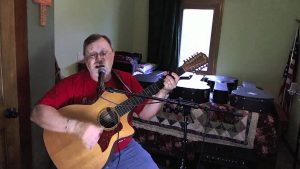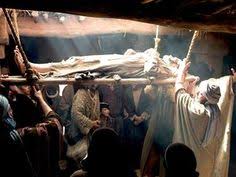Forgiveness and Healing
(Heb 4:1-11; Ps 78; Mk 2:1-12)
******************************************
Years ago, musician and songwriter Cary Landry came out with the hymn Lay Your Hands. One line in particular stands out: Let them bring your forgiveness and healing.

Carey Landry
The Gospel today on the healing of the paralytic invites us to come to Jesus for both forgiveness and healing.
This Gospel also brings to mind a painting of this event that is very striking. Jesus is seated among a crowd of people in a house. The four friends have dug through the roof and lowered the paralytic before Jesus. Sunshine is pouring through the roof, directly down upon Jesus, who is surrounded by a cloud of dust all illuminated by the sun.
That touch by the artist of bright, lingering dust filling the house is purposeful. It reminds us that this incident is not just a quaint story in the scriptures long ago, but that Jesus can offer us forgiveness and healing here and now, in the dusty mess of our lives.

As Ron Rolheiser points out in his commentary on the shepherd who leaves 99 sheep to go after one that strays, the sheep left behind were no better than the one that strayed. They also were lost and helpless in the wilderness. In other words, there are no righteous people. We have all strayed and wandered away from God’s purpose in our lives in one way or the other, and we are all in need of God’s forgiveness.
All we need do is repent, be willing to change our ways, and come back to receive the forgiveness of Jesus. That is what the sacrament of reconciliation is all about.
The same message applies to our need for healing. If we have all sinned and are in need of forgiveness, it follows that we are all in need of healing. Fr. Armand Nigro SJ, during a 30-day retreat years ago pointed out the difference between sinand sinfulness– our need for forgiveness, and our need for healing. Sin is our negative behavior and actions that hurt others; sinfulness is that which makes us sin. They are not the same. For sin, we need forgiveness; for our sinfulness, we need healing.
The 12 Step program of Alcoholics Anonymous is very clear on this point. Steps 4 & 5 (a searching and fearless inventory, and admitting our wrongdoing to God, ourselves and one other person) are all about receiving forgiveness. Steps 8 & 9 (apologizing to those we have hurt, and making amends to them wherever possible) are also all about receiving forgiveness.
Steps 6 & 7 (getting ready to have God remove all our defects of character and humbly asking God to do so), the core of the program, are all about healing. Our defects of character, that which makes us sin, are not our fault. We are not really responsible for them – they just are and cannot really be explained. What we are responsible for is the humility to face and admit them, and the faith to ask Jesus to heal them.
These character defects or our sinfulness are painful emotions like anger, resentment, bitterness, desire for revenge, hatred, jealousy, envy, impatience, and the list goes on. Or they can be negative attitudes like false pride, stubborn self will, cynicism, refusal to forgive, lust, control, attachment to power, and the list goes on. Sometimes the edges between these get blurred and they become both painful emotions and negative attitudes.
Any of these attitudes can become habits that slowly shape our character, and in the end, evolve into addictions that entrap us. One definition of an addiction is a pathological relationship with a mood-altering substance, event or person that has a major negative impact on our lives.
Guest House, a therapeutic centre for clergy and religious who are struggling with addictions, recently held their annual retreat/seminar at Fort Meyers, Florida. What a joy to be among men who have experienced both forgiveness and healing in their lives, and who continue to walk one day at a time in the light of that forgiveness and healing.
Deacon Steven D. nourished them with profound reflections on the program laced with the spirituality and the poetry of mystics past and present such as St. John of the Cross, Julian of Norwich, St. Simeon the New Theologian, Thomas Merton, Richard Rohr and especially surprisingly, Leonard Cohen.
He entitled the retreat The Gaze of Love – the Mysticism of the Steps.Like St. Paul, we are invited to fall in love with our God who is love and loves us unconditionally. Humility is the only really honest response to the mystery of God’s love. Our growth is truly a treasure hidden in a field, discovered as we let go of our own fear and attachments to self-image that allows the inner qualities to surface.
The homily each day was a powerful sharing of the homilist’s story of recovery and how that connected with the Word of God for that day. Very striking was how the endless denial and blame of an addict could be seen as the hardness of heart and not listening in the psalms and prophets.
The fellowship that is part of the program through sponsors and support groups, and that was an important part of the retreat through table sharing and conversation, is also a living out of the gospel – symbolized by the four faith-filled friends who dug through the roof to let down the paralytic before Jesus.
The Eucharist took on deeper meaning as all present celebrated not only the sacrament that makes present the love of God for us expressed by Jesus on the Cross, but also the forgiveness and healing that humble faith brought about, like the paralytic and his friends.
So, have faith, put your trust in Jesus as our Higher Power, come to him for both forgiveness and healing, and let him transform your life. And if you are in a 12 Step program – work the steps. They work if you work them.




This is a beautiful message and homily having both forgiveness and healing which is from God. We need to hear this lesson all the time and keep it in our minds if we encounter any negative thoughts and things. We always been tempted by evil spirits and by Satan asking us gaining negative thoughts like being angry, bitterness, stubbornness and having power . We will not come to our senses that we need to resolve our problems that happen in the past. If we do not face our problems and resolve if will control us for the entire life. You mentioned it pretty well in the 12 step program and in your book. Once we are forgiven for our sins and we forgive people that hurt us or if we have hurt them then Jesus will forgive us. If we go through reconcilation and confess all of our sins God then forgives us and heal us at the same time. If we are willing to repent by changing our behaviour and actions we will be healed. Amen. Many Blessings!
Thanks for so many words of having forgiveness and being healed as a person just like the paralytic and people with other sickness. Your words and phases is full inspiration and full of deep meaning . It’s beautiful to read it over and over again. I like all your writings and homilies. Bravo! Keep it up!